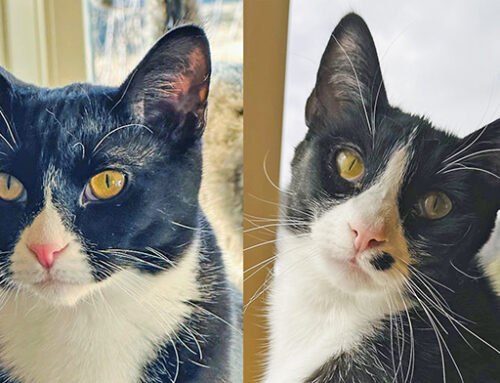I read an article in the New York Times about the use of robotic cats for therapeutic purposes with Alzheimer’s patients. At first, I thought it was offensive to the elderly patients, as well as to living cats who should be providing the therapy themselves. But as I read further, I pushed judgment aside, recognizing it actually honors both…
In the United States, more than 1 in 3 older adults dies with Alzheimer’s disease or a related dementia, for which there is no cure. Dementia affects more than 50 million people worldwide. The disease is often accompanied by behavioral and psychological symptoms, including depression, aggression, and anxiety. Medications used to treat these symptoms can have side effects, so alternatives are sought before relying on medication. This is how robotic cat therapy was born.
The Times article described a situation when a nursing home got its first robotic cat and tried it out on a resident in her late 70s who was searching in a panic for her long-deceased parents. Rather than the usual intervention of a tranquilizer, the patient was handed the robotic cat, and immediately calmed down.
The facility has since acquired 24 more, with plans to potentially triple that number. A staff member of the facility shared, “For a lot of our residents, it’s a chance to be a caregiver, and to be in an active, empowered role again, a lot of times this disease causes passivity, and we’re always looking for ways to combat that.” At times the program participants believe the cats are real, a caregiver explains, “as long as it’s a source of tremendous joy, we just follow the narrative.”
So why use robots instead of real cats? Those with Alzheimer’s are usually unable to provide proper care for a pet. The robotic cats are built to mimic live cats. They purr, blink their eyes in response to being spoken to, expose their bellies, and are soft and cuddly.
Additionally, although many care facilities are engaging in animal-assisted therapy during certain hours of the week, robotic pets provide benefits during the times of isolation, when awake at 3 in the morning and there is not an aide or therapy dog available.
Early studies on the application of therapeutic robotic cats are showing not only a reduction in the major impacts of the disease, such as depression, anxiety, and agitation, but a significant improvement in mood, behaviors, and mental acuity. They are proving to provide an alternative way for participants to express themselves. These improvements are translating to an improved quality of life for caregivers and family members too.
One of the researchers looking into the efficacy of these programs stated, “You wouldn’t think that a furry little movable cat would really make a difference, but it evokes emotional responses in persons with cognitive impairment who might not otherwise have the opportunity to experience something as delightful as just playing with a pet.”
People with Alzheimer’s disease should always be treated with dignity, respect and recognized as a whole person, regardless of their disease stage. Devices like robotic pets should be used to enhance relationships and not act as a substitute for relationships. When this is happening, I am all for these programs.
About me.
My name is Lollipop. I am still young enough to be called a kitten. I was abandoned but fortunately found my way to Second Chance because I am super friendly and love people. I would be very therapeutic to anyone willing to love me back. Come meet me!
Second Chance Humane Society’s Animal Resource Center and Thrift Shops have been servicing San Miguel, Ouray & Montrose Counties for 27 years. Call 626-2273 to report a lost pet, learn about adopting a homeless pet, or about our Emergency Response, Community Medical, Spay/Neuter, Volunteer, or other services. Submit questions to the Pet Column at: kelly@adoptmountainpets.org. View our shelter pets and services online: www.adoptmountainpets.org.







Leave A Comment